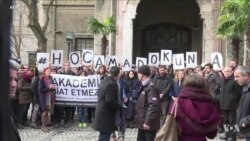More than 100,000 people who were dismissed from their jobs in the wake of the failed coup in Turkey are still awaiting justice, according to Amnesty International.
The human rights group said in most cases, the government has failed to present any evidence justifying the mass purge of public workers.
Meanwhile, critics say Turkey is exhibiting double standards in its demands for justice over the death of Saudi journalist Jamal Khashoggi, who was killed in the Saudi consulate in Istanbul. Hundreds of journalists have been jailed in Turkey in recent years.
In the wake of the failed coup in July 2016, Turkey imposed a state of emergency, and the government drew up decrees that led to the dismissal of almost 130,000 public workers, including doctors, police officers, teachers and civil servants.
The state of emergency ended this summer. But Amnesty International’s Milena Buyum said two years on, many of those dismissed are facing destitution.
“They are almost blacklisted. They find it really difficult to find work elsewhere. In the public sector it’s impossible, but even in the private sector they find it very difficult to be recruited for a position. So, these people have been destitute,” Buyum told VOA.
The government accused the dismissed workers of being members of proscribed groups allegedly behind the coup plot, led by the Turkish cleric Fetullah Gulen, who lives in exile in the United States. He denies any involvement.
Under international pressure, Turkey set up an Appeals Commission. It has received 125,000 applications from dismissed workers, but has processed less than one-third — of which fewer than one in 10 has been successful.
“As evidence, they included references to money deposited to a now-closed bank, for example, or a subscription to a particular newspaper, or membership of a particular trade union. All activities that are innocuous, and at the time they were undertaken, were not illegal,” said Buyum.
Campaigners say more than 200 journalists and dozens of human rights workers also have been arrested since the coup attempt.
Khashoggi
The killing of Washington Post writer Jamal Khashoggi in the Saudi consulate in Istanbul has focused global attention on the targeting of media workers. Turkey’s President Recep Tayyip Erdogan has strongly condemned the killing and has demanded justice. Activists accuse Ankara of double standards.
"We want the Turkish government, which unfortunately has an abysmal record with the treatment of journalists on its own, as does Saudi Arabia, to step forward, to use this as an opportunity to move forward into the future, out of the past, and to do something to help bring transparency and put an end to this kind of brutal treatment of journalists,” Louis Charbonneau, the United Nations director at Human Rights Watch, told reporters at a recent press conference following Khashoggi’s killing.
Buyum welcomed Turkey’s tough response.
“We would like to see the same rigor in demanding justice for everyone in Turkey,” she said.
Many of those arrested during the state of emergency are still on trial, including dozens of journalists and several Amnesty International activists.






